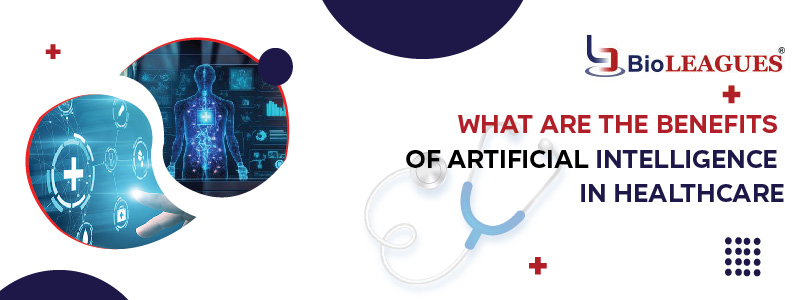The medical industry is undergoing a revolution thanks to artificial intelligence (AI), which benefits doctors, patients, and the system as a whole. From faster diagnosis to personalized treatments, AI in healthcare is making a big difference. AI can also improve patient safety through automated monitoring and analysis. AI has the potential to revolutionize the healthcare industry.
You’ve probably seen “Artificial Intelligence in Healthcare and Medicine articles” or even searched for an “Artificial Intelligence in Healthcare PPT free download” to understand how it’s being used. This blog will discuss the benefits of AI in Healthcare.
Faster and More Accurate Diagnoses
One of AI’s most significant advantages in healthcare is its ability to speed up diagnoses while making them more accurate. Traditional diagnostic methods can take time, and sometimes errors happen. AI-powered tools, such as those discussed at the “Machine Learning in Healthcare Conference 2025,” can analyze medical data faster than humans. These devices can sort through vast volumes of data, such as MRIs, X-rays, and lab results, in order to spot patterns that medical professionals might overlook. This means quicker treatment for patients and improved outcomes.
For instance, AI has shown incredible success in detecting conditions like cancer and heart disease. AI is able to identify these diseases in their early stages, which is critical for successful treatment. This means better patient survival rates and less strain on healthcare resources.
Personalized Treatment Plans
Every patient is unique, and one-size-fits-all treatments don’t always work. AI is helping doctors create personalized treatment plans based on a person’s medical history, lifestyle, and genetic information. Imagine a tool that can take data from millions of patients, compare it to your health records, and suggest the best course of treatment. AI makes this possible, offering more tailored solutions for patients.
Personalized medicine is becoming more popular because it has the potential to assist doctors in choosing treatments that are more likely to be successful for individual patients. This approach reduces the trial-and-error phase of treatment, which can sometimes take weeks or months. As more AI tools become available, expect to see this personalized approach become the standard in hospitals worldwide.
Improved Efficiency in Hospitals
Managing a hospital is challenging. Patient records, staff schedules, and equipment usage are just a few of the many moving components. Hospital efficiency can be increased by using AI to streamline these procedures. Artificial intelligence (AI) can be used for anything from patient flow management to surgery room scheduling. Better patient care results from these systems’ ability to minimize human error and ensure smooth operation.
Hospitals also use AI to predict future needs. For example, during flu season, an AI system can analyze data and predict how many patients might come in, helping the hospital prepare in advance. This ensures that there are always enough staff and resources to handle patient needs.
Reducing Human Error
Doctors are highly skilled, but they are still human and can make mistakes. AI can help lower the possibility of mistakes, particularly in intricate medical diagnoses or procedures. For example, AI-powered robots are being used in surgeries to assist doctors, providing more precision and control. This can lead to fewer complications and quicker recovery times for patients.
AI is also useful in reducing medication mistakes. It can happen to staff members in a busy hospital to give the wrong medication or even the wrong dose by accident. AI can identify possible errors before they occur, guaranteeing that patients get the proper care.
Helping with Medical Research
The use of AI is also speeding up medical research. Traditionally, medical research can take years to produce results. But AI can analyze large sets of data quickly, providing researchers with insights that would take humans much longer to uncover. This means faster development of new treatments and cures.
AI is particularly useful in drug discovery. It can analyze the effects of different compounds on various diseases and predict which ones might work as treatments. This can save millions of dollars in research and development and bring new drugs to market faster.
Researchers and doctors attending conferences like the International Conference on Artificial Intelligence for Healthcare are sharing these advancements, which makes the future of medical research more promising.
Better Patient Monitoring
AI-powered devices and apps are making it easier for doctors to monitor their patients in real-time. Wearable technology, like smartwatches, can monitor vital signs like blood pressure, heart rate, and oxygen saturation. These devices alert both the patient and their doctor if something is wrong, even before symptoms appear.
For people with chronic conditions like diabetes or heart disease, AI offers a way to manage their health more effectively. By collecting data continuously, AI can help doctors adjust treatments based on a patient’s day-to-day health. This kind of personalized care could significantly improve the quality of life for people with long-term health issues.
Cost Savings for Hospitals and Patients
Healthcare is expensive, but AI can help bring down costs. By improving efficiency and reducing human error, AI can save hospitals money. For patients, quicker and more accurate diagnoses mean fewer doctor visits and shorter hospital stays, which also cuts costs.
AI tools are also making healthcare more accessible. Patients are increasingly using telemedicine, which enables remote consultations with physicians, particularly in the wake of the COVID-19 pandemic. AI can assist in these consultations by analyzing patient data and providing doctors with recommendations, even if they’re miles away.
Enhanced Medical Training
AI is not just benefiting patients but also doctors in training. New techniques are being taught to medical students and even experienced doctors through the use of virtual reality (VR) and AI-powered simulations. These tools allow doctors to practice in a risk-free environment before performing actual surgeries or procedures. Attendees at events like the best AI in healthcare conference 2025 often discuss how AI is improving medical education.
This kind of training helps reduce the learning curve for new doctors and ensures that they are better prepared when they begin practising. It also allows for continuous learning, as AI can introduce new scenarios based on the latest research and medical advancements.
Availability of Educational Resources
For those looking to dive deeper into AI’s role in healthcare, there are many resources available. If you’ve ever searched for artificial intelligence in healthcare PDF or looked for artificial intelligence in healthcare PPT free download, you’ll find plenty of material to help you understand the growing field. If researchers, students, and medical professionals want to stay up to date on the latest developments in artificial intelligence, these resources might be beneficial.
Numerous documents from this collection offer insights into recent research and case studies that demonstrate how AI is already changing healthcare facilities worldwide.
Conclusion
Thanks to artificial intelligence, healthcare is undergoing a revolution. AI is also cutting costs and increasing the effectiveness of medical procedures. Whether it’s through faster diagnoses, personalized treatment plans, or better patient monitoring, the impact of AI is undeniable. Conferences like the machine learning in healthcare conference 2025 and the international conference on artificial intelligence for healthcare are just a few of the events that highlight these advancements.
As more hospitals and medical professionals adopt AI tools, the future of healthcare looks bright. Artificial intelligence has several advantages in healthcare and medicine already, and these advantages will only increase. For more insights, consider reading artificial intelligence in healthcare articles or downloading materials like the artificial intelligence in healthcare pdf to stay informed about the latest developments.
With AI continuing to evolve, the healthcare industry is clearly on the brink of an exciting transformation.
Frequently Asked Questions (FAQs)
1. How is AI improving diagnoses in healthcare?
AI is far faster than humans at analyzing large volumes of medical data, such as lab results and X-rays. It helps doctors catch diseases early, leading to quicker treatment and better outcomes.
2. Can AI completely replace doctors in the future?
No, AI is not meant to replace medical professionals; rather, it is intended to supplement them. Despite helping doctors make more accurate decisions, treating patients still requires human expertise.
3. Is AI used in surgeries?
Yes, AI is being used in surgeries to assist doctors. It improves precision and reduces the likelihood of errors during complex operations.
4. How does AI help with patient monitoring?
Smartwatches and other AI-powered gadgets can continuously track vital signs. These gadgets allow physicians to respond more quickly by warning them when something is wrong.
5. How is AI making healthcare more affordable?
AI helps hospitals run more efficiently, which can reduce costs. It also speeds up diagnoses, which can lower hospital stays and doctor visits, saving patients money.
6. What is personalized treatment, and how does AI help with it?
Personalized treatment means tailoring medical care to individual patients. AI looks at a patient’s data, such as medical history, to suggest the best treatment options.
7. How can I learn more about AI in healthcare?
To learn more about this topic, you can read “Artificial Intelligence in Healthcare articles” or download free resources like the “Artificial Intelligence in Healthcare PDF.”
8. Will AI reduce human errors in hospitals?
Indeed, prescription errors and misdiagnoses can be detected early on with the help of artificial intelligence. As such, there is an improvement in patient safety and efficiency.




